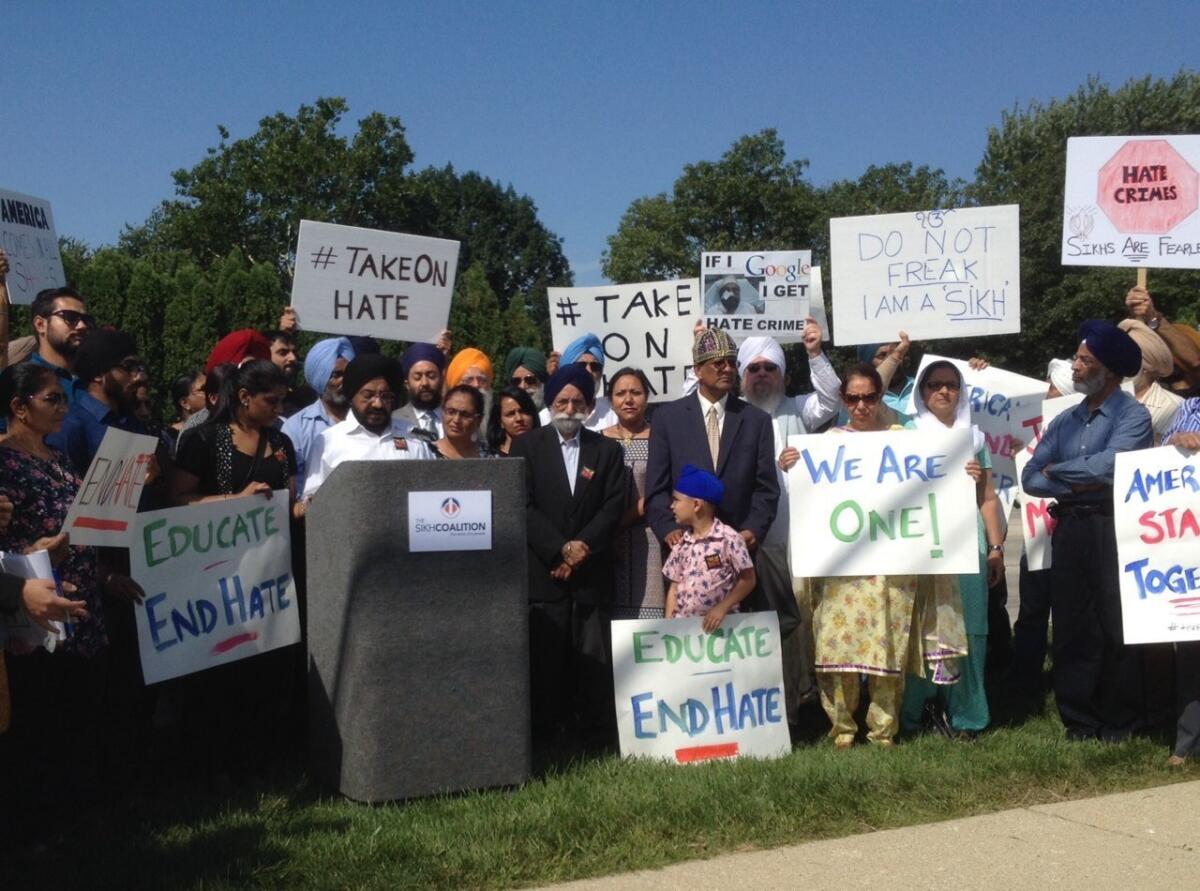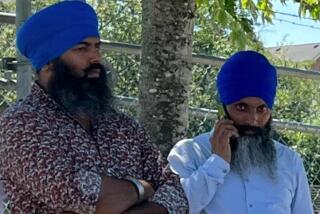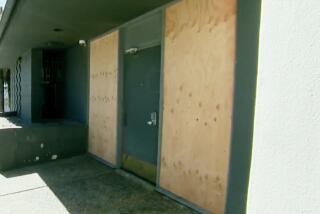For Sikhs, often mistaken as Muslims, it’s ‘a hostile time, a scary time’

On Sept. 15, Inderjit Singh Mukker, at podium, speaks at a news conference in Darien, Ill., saying because of his brown skin, turban and beard, he was the victim of a beating.
- Share via
Early Saturday morning in northwest Fresno, a 68-year-old farmhand waited curbside for his ride to work pruning grapevines at nearby vineyards.
It was a typical Central California scene, except for the way the man was dressed — Amrik Singh Bal, who is Sikh, wore a full white beard and a turban. Shortly before 7 a.m., two men pulled up in a truck, hurled insults at Bal, and when he tried to cross the street to get away from them, they backed the truck into him, then beat him up before skidding away, police said.
“Why are you here?” one of the men said as they assaulted Bal, leaving him with a broken collarbone and cuts to his nose and hand, police said.
Join the conversation on Facebook >>
Just what motivated the men, who are still at large, remains under investigation, local and federal authorities said. But as word of the incident spread Monday, for many American Sikhs much of it rang all too familiar.
Since the Sept. 11, 2001, attacks, Sikhs have often been subjected to violence or harassment by people who mistakenly perceive them as Muslim. Between anti-immigrant and anti-foreigner political rhetoric and the recent terrorist attacks in Paris and San Bernardino, several members of the Sikh community said the animosity has felt recently like it’s at an all-time high.
“It’s a completely different, permissive environment,” said Prabhjot Singh, a physician and professor of medicine in New York who was attacked by a mob near Central Park in 2013. “It feels to me that it’s open season on Muslims or people who look different — and Sikhs are certainly one of the most visible representations of that.”
“Osama” and “terrorist” are the snippets of insults that Singh remembers the 20 or so young men yelling at him during his own attack, which left him with a fractured jaw and several teeth dislodged. He said he continues to hear such remarks a couple of times a week in Manhattan, where he lives and works, with an unmistakable increase immediately after incidents of terrorism.
Harsimran Kaur, legal director of the Sikh Coalition, which provides legal representation for victims of discrimination and attacks, said her organization received three times as many requests for assistance this month compared with December in previous years.
“It’s definitely a hostile time, a scary time,” she said. “The Paris and San Bernardino attacks, as well as all of this rhetoric by politicians about Islamophobia and xenophobia — all these incidents have emboldened people who feel biases to act out.”
By Monday, the coalition and other Sikhs had taken to social media, posting their family stories with the hashtag #whywearehere.
It’s a completely different, permissive environment. It feels to me that it’s open season on Muslims or people who look different.
— Prabhjot Singh, a physician and professor of medicine in New York who was attacked by a mob near Central Park in 2013
Saturday’s early morning attack was the second in recent memory in Fresno against a Sikh man. In 2013, an 82-year-old man was struck with a steel pipe outside a Gurdwara, a Sikh temple.
After Gilbert Garcia Jr., then 29, was arrested on attempted murder charges, the police chief there held a community meeting to reassure members of the area’s large Sikh community that the attack was an isolated incident.
Garcia was sentenced to 13 years in prison in September.
In Orange County this month, less than a week after the attack in San Bernardino left 14 dead and 22 injured, someone spray-painted an expletive and “ISIS” on a trailer parked outside a Buena Park Sikh temple.
Brodie Durazo, a 20-year-old nearby resident who admitted vandalizing the trailer, later apologized to the congregation at the temple, saying it was an alcohol-fueled “idiotic decision.”
“I know your guys’ faith and church have nothing to do with the Muslim religion or Islam,” he said, according to a video posted by the Sikh Coalition.
The incidents of verbal and physical abuse have also led to soul-searching within the Sikh community about how best to react to such hostility. Although some Sikhs complain that they are being unfairly burdened with a stereotype and prejudice that’s not their own, others say it’s also wrong to simply redirect the blame at Muslims.
Naindeep Singh, a Fresno-based Sikh community activist and youth organizer, said that when a man yelled at him in a New York subway and accused him of being Muslim a few years ago, he responded that he was.
“I said ‘I am, what are you going to do about it?’” Singh recalled. “The voice in the community can’t be, ‘Don’t pick on us, pick on them.’ We’re all American. This is wrong, period.”
Gurinder Mann, a retired professor of religious studies at UC Santa Barbara, said he attempts to talk with those who insult him on the street to educate them about Sikhs’ religion and traditions. The turban, which boys start wearing around age 12 as a symbol of entering adulthood, was a sign of nobility when the practice first came about.
“It’s ironic that it’s now a symbol of fanatics or fundamentalists,” he said. “I have the obligation to resolve it, rather than complain about it.”
Prabhjot Singh, the physician, said he believed that the charged environment was an opportunity to show the rest of America who Sikhs are and what they stand for.
“This is a time to literally stick your neck out,” he said. “It’s a time to be very clear about who we are.”
[email protected] | Twitter: @vicjkim
[email protected] | Twitter: @josephserna
ALSO
Buena Park man admits vandalizing Sikh temple, police say
Sikh man is hit by a truck and beaten by two men in Fresno hate crime
Hundreds march down Beverly Boulevard to mark the anti-Sikh ‘holocaust’ of ’84 in India
More to Read
Sign up for Essential California
The most important California stories and recommendations in your inbox every morning.
You may occasionally receive promotional content from the Los Angeles Times.












